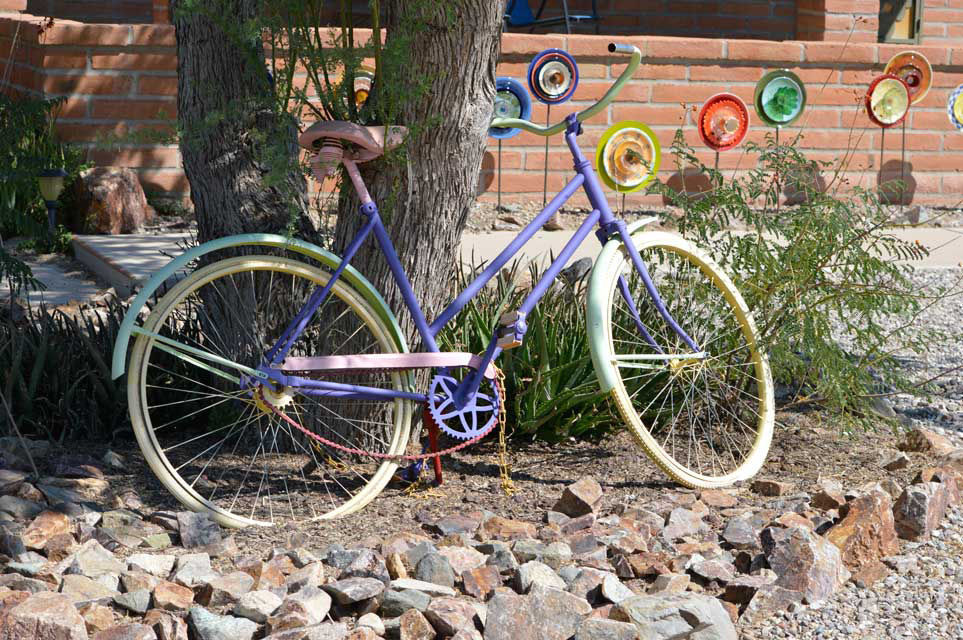A strange noise woke midtown resident Leif Abrell at 1:30 a.m. on Sept. 28.
He got up and noticed that the door to his carport was open. Alarmed, he immediately checked to see if anything valuable, such as his television, was missing.
At the time, Abrell didn’t notice anything in particular. But the next morning, he woke up to find that his treasured custom-made mountain bike had been stolen from his dining room.
And he found a much-inferior bike deserted on the side of the street next to his house. Abrell reported the theft to police.
Months later, his bike is still gone.
“I didn’t have high hopes, but I had some hopes that something would happen,” he said. “Nothing really happened.”
He is not alone in that experience.
Nearly 1,200 bikes have been reported stolen to the Tucson Police Department so far in 2017. Only about 3 percent of those cases ended in arrests of suspected thieves, and there’s no way to know how many of those who reported thefts got their bicycles back. The police don’t track that.
“It’s definitely one of those things where you feel kind of hopeless,” said Colin Holmes, a bike mechanic at Bicycle Inter-Community Art and Salvage, or BICAS, a nonprofit bicycle center.
Though he said he has personally recovered stolen bikes for both BICAS and community members before, statistically speaking, many Tucsonans who have their bikes stolen won’t recover them.
Sixty-three percent of the reported bike-theft cases in 2017 were marked as “cleared,” meaning they reached some sort of conclusion. More often than not, that means there wasn’t enough evidence to continue pursuing an investigation.
“Bicycles don’t need to be registered like vehicles,” said Officer Chris Hawkins, a Tucson police spokesman. “It’s a little bit more difficult to track in that sense.”
A major difficulty in pursuing bike-theft cases is the lack of serial numbers, Hawkins said. Descriptions alone, unless they are very specific and unique, such as personal engravings, don’t always help connect a stolen bike to its owner.
With serial numbers, second-hand shops can look up suspicious items, including bicycles, using a database they share with the police, he said. They can then alert officers.
There are also cases where stolen bikes are retrieved by police and kept in the evidence section, but don’t make it back to their owners because they don’t have unique identifiers like serial numbers, he said.
Holmes of BICAS said he monitors social media, Craigslist and the police auction site to keep an eye out for stolen bikes. Being a long-time bike mechanic, he’s got a keen eye for unique bike parts and has taken matters into his own hands before.
He’s confronted people riding bikes he recognized as stolen and gotten them back, he said. Most of the time, they are calm exchanges that don’t involve violence or police.
“I wait until the bike is unattended, lock it to a rack and tell the person we have to talk,” he said. Also, it’s good to keep in mind that not all those who ride stolen bikes are the thieves themselves.
In one instance, security footage and social media helped him find a stolen BICAS bike. A man gave false identification — most shops require ID for a test ride — and rode off.
BICAS staff shared the footage of him on social media and eventually a community member saw the stolen bike parked outside a store at Tucson Mall. Holmes showed up, and so did police officers, who took care of the situation.
“It’s a rare case when all of the factors come together that the police can get involved,” Holmes said.
Local bike advocates say cyclists and the community could do their part to prevent bike theft or help police recover stolen bikes.
“The thing that most people should do that they don’t is record their serial numbers and the make and model of their bike and register them,” Holmes said. “That’s an important step every cyclist can take. We’d be able to recover a lot more bikes if everybody did that.”
Tips from Kylie Walzak, a program coordinator at the Living Streets Alliance, include:
- A good U-lock is worth the money.
- Avoid parking your bike in dark, shady places.
- Lock both the wheel and the frame.
- Avoid leaving bikes locked outside overnight.
- Cover nicer bike parts with stickers or remove brand names.
Abrell’s custom mountain bike did not have a serial number. It was one of a kind, designed to allow him to ride both in mountainous terrain and on long stretches of highway.
“I feel like somebody broke my leg,” he said. “It’s disabled my ability to ride the kind of rides that I like to do.”
A bright orange three-wheeled cargo bike he reported stolen about five years ago also did not have a serial number. He ended up finding that one — a friend saw it on the police auction website, but it had already been sold.
In both cases, Abrell said the bikes were unique-looking. If police had a better way of tracking physical descriptions, he thinks more bikes could end up back with their owners. But he also knows bike theft isn’t the most pressing issue that police have to deal with.
“I believe that Tucson police are doing a good job at what’s important, and that’s life-threatening crime” Abrell said. “This is not life-threatening.”





